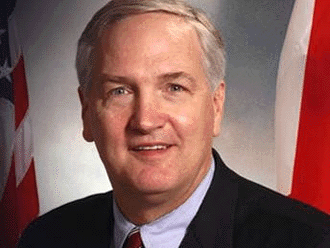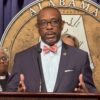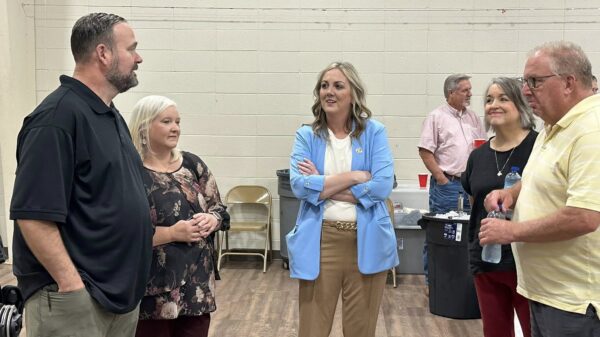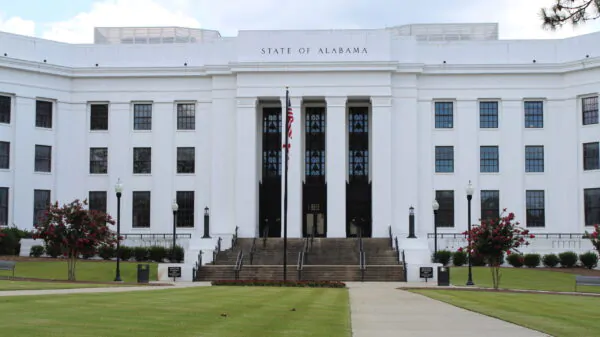By Bill Britt
Alabama Political Reporter
Recently, we had the distinct pleasure of talking with Alabama’s Attorney General Luther Strange.
Strange is entering his second year as AG and we wanted to have a conversation about the work of the last year and the things facing the state in the new year.
Much has changed around the state since Strange has taken office among those in law enforcement there is a renewed confidence in the office of the Attorney General. Luther Strange is a man that quietly exudes trust, confidence and character. His conversation is full, honest and enlightening. Since taking office Strange and his team have face momentous challenges from immigration reform to man-made and natural disasters. On every occasion, Strange has tackled each event with his unmistakable calm and conviction.
APR: Our general idea today, was to let you talk about whatever is on your mind but I know a lot of people want to hear what you are thinking on immigration. Now, you guys have been beaten like rented mules on immigration so, I don’t know if you want to talk about that today.
STRANGE: I do want to talk about that and answer any questions you might have. I can give you kind of the waterfront view here of what all we are doing in terms of priorities.
The first, of course, was to establish a strong team in our executive office which we have done. We have added about half a dozen very bright young lawyers. Many who have clerked for judges and, for example, our solicitor worked on the Supreme Court.
Really sharp 30-something lawyers that have private firm experience that wanted to come and do public service and then I hope will go back into the private sector and maybe run for office someday or be a judge. This is very important.
We put in place probably the best investigative, white-collar public corruption team in the country, really, with Matt Hart and John Gibbs, two really experienced prosecutors and Tim Fuhrman who was former FBI bureau chief in Mobile/Montgomery and one of his deputies.
Public corruption and white-collar crime is something that I have talked a lot about. We are going to focus on that going forward. So, personnel and putting together the right team was important. We’ve done that and I am really comfortable that we have a super group.
And then, of course, the issues.
Starting with the oil spill, that has probably been my top priority in terms of time. The oil spill case against BP. You know, Alabama sued BP. The first thing I did when I came into office was to replace the private law firm that Troy King had hired on a contingency fee basis and brought the case in house. Now, we don’t have to pay any outside legal fees and we can keep the recovery [monies] for the citizens.
The case is being tried in New Orleans in what is called a multi-district litigation case, which are these massive cases with thousands of plaintiffs, private plaintiffs, five states, the United States Government, and eight defendants to manage. They require very special judges in these very special cases. The good news is the judge appointed me to ordain a council for the states so that Alabama has a seat at the table, literally, which gives us a great opportunity through litigation to really make our case. So that is really good.
The amount of money that we could possibly recover is very high. I don’t have an estimate but it is very significant because you’ve got economic damages to our economy and you have environmental damages to the state. And so, we are working very hard on that case. And that is going very well so far.
The trial is scheduled for February 27. Sometime between now and then there will be discussions about trying to settle this case. There are a lot of people in the legislature that want to get some of the money from this settlement to fill in holes and so you will just have to stay tuned on that and see how it goes.
Our job is to focus on the trial. The Governor’s office, Cooper Shattuck, and the Governor’s team are doing all of the damage analysis, what damages we suffered and all, what the numbers are. The BP case has been a huge issue for us.
APR: Before you took office the matter of Bingo seem to be an everyday topic in the news, what is different now?
We have changed the debate on the gambling controversy. What I did when I came to office was to go to all of the law enforcement in the counties where there is a bingo amendment, a charitable bingo amendment, and I told them all, “Here’s the deal. Slot machines are illegal, period. The games you are operating have to be traditional bingo the way the court defined it in the Cornerstone case, which is the test, and it is a six-point test. Card traditional bingo the way that you and I understand it. And the third thing is, it has to be for a charitable purpose. You can’t pay someone to operate the game. It has got to go to charity.” So we told them all, “Look, we are going to come and investigate your places and we are going to shut you down for not complying but we will allow you to go to court and if you can prove that what you are doing is legal, then you can operate. If you can’t, you are going to be shut down.”
And so, we have taken it off the front pages. It is in court now. We actually have one case pending before the state supreme court that I hope will give us the final answer on these machines that they are illegal and that will help to knock that out. That is where that stands and that has been good because that has been such a controversial issue when I came into office. It really got Bob Riley all tied up in committing resources to that.
APR: One of the things that you are doing that is kind of unique is that you are bringing these cases in house and not farming them out to other law firms.
STRANGE: That’s right. We have reduced our legal bills by a very significant amount. The number of lawyers we hired are doing the work they were doing outside for a lot more money than we are paying now to do it with our own staff. We have saved an awful lot of money there. Plus, we got rid of the task forces and that saved an awful lot of money, too.
Of course, we are working on some of the other legislation that came out of the last session. The redistricting, for example, of the school boards and the congressional districts. We got that approved in record time by the courts and justice department. So that is good. Now we’ve got upcoming the legislative redistricting. That is going to be tougher I think because it typically is, but I like what we have done so far.
We are in court now on the PAC-to-PAC and the Dues Checkoff legislation that goes after AEA. And we have been basically winning those cases. There is one part of it…this idea of what is electioneering. This view we have of AEA is this, I think that when they say they are “educating their voters” they are basically campaigning for or against somebody. And they will tell you that they are just informing them of the issues. I think, given their history, that it is very clear that they are telling people how to vote. But that issue is going to be before the state supreme court and hopefully we will get an answer from them soon.
APR: I just recently did a story on our prisons and the overcrowding situation and how sentencing reform is being talked about as possible factor in relief. The story received a lot of traffic and people are talking about sentencing reform these days.
There was some interesting testimony before the federal Sentencing Commission pointing out that in effect the mandatory minimums have had some a counter effects on the prisons. There is a sense that the line of justice on this has really gone the opposite way. Now we are kind of uniformly punishing folks and the punishment is not fitting the crime. Many are saying that we have lost the sense of just desserts.
STRANGE: Yeah, I do. I actually was on a panel at the Federalists Society Meeting in Washington, DC, about a month ago. We talked about that with Judge Clement who is on the 5th Circuit Court of Appeals and other experts from around the country. I probably was invited because of Judge [Bill] Pryor, who was my predecessor. Bill was particularly interested in truth in sentencing that was an issue that he was really concerned about so I have become familiar with it and I have been working with Cam Ward [Senator Cam Ward is Chairman of the Joint Commission on Prisons] on that. I read your article I think it captured where we are with the prisons being at 190 percent capacity or more.
We are incarcerating a lot of people and the question is are we really being fair to victims who expect people to serve the time that they have been sentenced to? Particularly with serious crimes, are we being fair to victims and are we truly going after and punishing the bad guys? Are we giving the people who maybe have a chance to take back their lives a chance to do that?
The way I break it down, and I have talked to Cam about this because I am going to work closely with the legislature on it, I think that there are three areas. There is one area which is the death penalty, we have lots of people on death row and they are there for long periods of time probably an average of well over 20 years. That is a very long time for victims to have to endure.
Texas and some other states have found a way to expedite that process insuring that people have all of their rights of appeal, no innocent person is ever executed, all of those kinds of things. So you want to be tough on the worst of the worst and I think there is a way to expedite the sentence for these crimes.
And the second area is, are you going to sentence the really bad guys to the sentence that they are actually given? That is the truth in sentencing part. Somebody commits a terrible, heinous crime and they get sentenced. The victims want to know when are they going to get out, in 10 or 20 years, or 3 years?
The third area, and this is probably the toughest area, Cam and I have talked a lot about this, what can you do with the people who can possibly be rehabilitated? Or who are caught up in drugs? Or have done something that if they had been given the right discipline and possibly treatment they could be salvaged and saved from a life in prison?
What I am interested in looking at, and I have been doing this, is to find out what works in practice. I actually had the former attorney general of Virginia come to Montgomery to talk to us about that. And I have met with some key people from the Texas system. They have been able to do a lot of work in this area. Those states are strong on crime, strong on enforcement, tough on crime but they also have limited resources and we are looking at their results.
There is another area that maybe you and Cam talked about that I am interested in learning more about and that is this risk assessment process. Risk assessment has become almost a science and if you have the right people accessing risks of various offenders when they come into the system and at every stage throughout the system of prison until the time they are released. There is a pretty good statistical science now that can tell you pretty accurately what they need and how likely they are to re-offend. Right now we are not doing very much of that. But if it is something that can be implemented you are more assured that you are going to do the right thing with some of these low-level offenders.
One of the things that makes this whole thing complicated is, there is a good example that happened about six months ago. An officer was killed in Anniston, his name was Justin Sollohub, he was just 26 years old. He was chasing a guy around the corner in the projects. The guy he was chasing was a pretty well-known druggie, he chased him around the corner and got shot and killed. The guy [had previously been released] after a very short-term sentence for dealing drugs. Now, he had never killed anybody but he was released. A situation like that makes people have to say, “Well, you know, you can’t be releasing these people because you don’t know what they are capable of doing.” That is a tough thing and that is why it is going to take working with our judges and with our prosecutors to make sure everybody is on the same page including the victims groups to come up with a system that works.
APR: As you know my wife Susan helped facilitate a couple of half-way homes in St. Clair county while we were there. While there were problems, these were women, who are much easier to manage than men in these situations, but there was success among a few of those women and really success among a handful of them. So there is a reason to look at this smaller community situations like this.
She worked very closely with [District Attorney] Richard Minor, [Circuit Court] Judge Phil Seay, and [Circuit Court] Judge Jim Hill. These men knew a lot of these offender, they knew their family, they knew the background and they were able to make some assessments that “this one” would be okay, and “this one” wouldn’t. Since so many of these mandatory minimums are federal, how do we get, or can we get more control in the hands of the local DA and the local judges.
STRANGE: I think you have to have the judges’ support. A judge would have to buy into this because if they don’t and they are being mandated by someone from Montgomery or whatever, they are not going to be happy and it is not going to get anywhere. So, that’s where, I think, you have to have a buy-in from the judges. They want to protect their discretion because of just exactly what you said, they understand, by and large, who these people are and where they come from (what part of the county), what their lives are like and how bad the crime was. And, so I think, that any solution has to go in that direction. Where it gets to be tough is you cannot have some racial disparity or doing favors for friends and all that. At some point, you have just got to rely on the system to work.
In the next part of our conversation, the Attorney General talks about the effects of the state’s law enforcement and prosecution of crime, his first year in office and immigration.























































